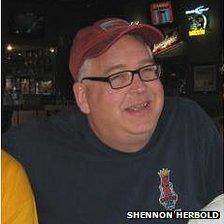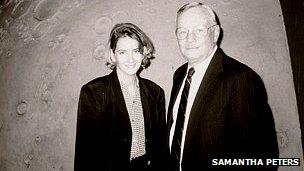Neil Armstrong: Your memories
- Published
Neil Armstrong, the first person to land on the Moon, has died aged 82.
In a statement, the family of the former US astronaut says he died from complications from heart surgery he had earlier this month.
He set foot on the Moon on 20 July 1969, famously describing the event as "one small step for man, one giant leap for mankind".
BBC News website readers have been sharing their memories of the pioneering astronaut.
Shennon Herbold, Kansas City, US

Shennon Herbold: "It's another moment in time that a great American has gone"
I remember that night in 1969.
I was seven and my sister was six and we were playing outside on the farm in Iowa.
My mum had to call us in to watch the event.
My parents, my sister and I all sat in the TV room wondering what would happen when the astronaut climbed off the ladder and hit the moon's surface.
There was talk that the moon was very soft and that the astronaut would sink in.
It was certainly soft but no danger of quicksand.
I remember thinking, wow, this is really happening.
When the broadcast was over I went out to look for the Sea of Tranquillity.
I'm glad my mother made us watch it because it was a historic event.
When I heard that Neil Armstrong died I thought it's another moment in time that a great American has gone - it's sad.
Samantha Peters, London, UK

Samantha Peters with Neil Armstrong
I was working as a researcher for chat show host Michael Parkinson.
The BBC was celebrating 60 years of television and Neil Armstrong had agreed to record a birthday message.
I was lucky enough to fly to Cincinnati to meet him.
We met in a museum, which was closed for renovation. It had a Moon in the reception area.
He turned up and recorded a short message for us.
He was so incredibly charming and charismatic.
He had a photographic memory. We both agreed what he was going to say and he wrote it down.
We did only one take, and there were no mistakes and no repetition - he had instantly remembered the text.
But he didn't want to mention the Moon and we had a little bit of a struggle about this.
In the end he agreed to say "space", but not "Moon".
He said that he was very young when he stepped on the Moon and that it was a long time ago, so let's move on! He was very humble.
In the recording he said something like: "The BBC was there, when we were there."
It was an incredible moment - one of those moments that stand out.
Rod Olsen, Canberra, Australia
When Neil and Buzz landed on the Moon, I was teaching in a small village in the bush.
I was 20 years old and had been a school teacher for just about a year.
I knew the Moon landing was history in the making and I wanted to help the students understand that they were a part of the big world.
There were four houses in the village that televisions so I closed my school for the day and arranged for my 33 students to see the broadcast in the four houses that had a TV.
The pupils were between five and 12 years old and for some it was the first time they saw a television.
Bush schools did not have TVs. Electricity had only reached the village 18 months before I went there.
It was hard to get the children to understand the enormity of the Moon landing. Most had never been to a major city.
I hope that in later years they would be grateful for the opportunity to see history being made.
Vijay Bhatia, Dubai, UAE
I was just seven years when I saw the Moon landing.
I couldn't really understand what was happening Neil Armstrong walked on the Moon on that day.
I remember my father explaining it all to me with so much excitement and pride.
Now each time I see a clear view of the Moon it will remind me of Neil Armstrong, and that he has walked on not just one but two planets.
He has left a legacy behind for many generations to come.
- Published26 August 2012
- Published25 August 2012
- Published26 August 2012
- Published25 August 2012
- Published25 August 2012